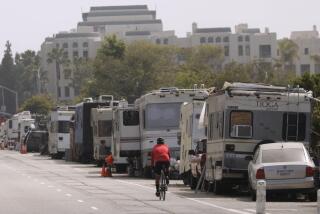Trailer Park Tenants Are Hoping for a Reprieve
CUDAHY — There is little shade, not much green and no rainbows at the Shady Lanes, Green Acres and Rainbow trailer parks on Cecelia Street. And the Little Gem Trailer Park is a gem only to the people who live here.
All four trailer parks lie in the heart of the city’s industrial area, surrounded by machine shops, chemical companies and other buildings of aluminum surrounded by eight-foot chain-link fences topped with razor wire.
It is not the greatest place in the world to live, tenants say, but it is cheap and people are friendly. As resident Terry King said, “If I had to move, I don’t know where I’d go and what I’d do.”
City Council members are now considering allowing King and about 200 other residents of the four trailer parks to stay where they are by overturning a 25-year-old law that would have forced the park residents to move by Aug. 4 to make way for more industry.
Council members have said that as long as the park owners obey building and health and safety codes, the tenants should be allowed to remain. The council will vote on the issue March 4.
State law requires that the city pay relocation costs if the trailer park residents are forced out by a city law. That is a daunting prospect for financially strapped Cudahy. City Manager Jack Joseph said there are about 100 trailers in the industrial zone, and the costs for relocation could exceed $1.5 million.
“We just can’t afford it,” he said. Officials predict that the city will be running a budget deficit of $241,700 by July.
Joseph and council members said that money problems are not the only reason the law calling for closure of the trailer parks may be repealed. “The council is not excited by (the idea of) throwing people out of their trailers, either,” Joseph said.
Councilman Joseph Fregeau added that many of the residents earn little money and could not afford to go elsewhere. “A lot of them are senior citizens and people with little income,” Fregeau said. “We wouldn’t know what to do with them.”
The question surrounding the fate of the trailer parks is rooted in a 1963 decision by the Cudahy City Council that declared the town’s southern portion would be reserved for industry. The area’s trailer parks would simply have to close, because an industrial area is not a fit place for people to live, and the land could be put to better use, council members said. The council created an industrial zone and gave the trailer park residents 10 years to move.
Three years later, the City Council decided to extend the time to 25 years, thereby giving the trailer park tenants until this August to move.
“We were getting a lot of flack,” said Earnest B. (Bud) Bristow, who sat on the council from 1962 to 1982. “People said it wasn’t right to make them move. It was hard to find another trailer park, even back then.”
Bristow said that at one time, there were more trailer parks than industrial plants in the area. Today, there is no doubt that it is an industrial block.
Every once in a while, usually in the dead of night, the acrid smell of chemicals wafts through the neighborhood. Rainbow Trailer Park tenants Roxanna and David Sanchez say that sometimes they are awakened at 4 a.m. by trucks rumbling down Cecelia Street. An incessant high-pitched drone emanates from a machine shop where a sign advertises metal grinding, welding and spraying.
Cliff Griggs, a retired welder, has lived in the Shady Lanes trailer park for the last five years. He pays $375 a month to rent a one-bedroom trailer with a kitchen and front room. He says the noises and the occasional smells do not bother him, and he is relieved that the City Council is thinking about letting him and his neighbors stay.
“I couldn’t afford to go anyplace else,” Griggs said. “If I was able to move on my own, I would be gone already.”
Marie Strain moved into Space 67 at the Shady Lanes trailer park in 1961. She and her husband, Lyle, raised their three children in the blue and white trailer, which they own. Marie Strain was one of the few residents who had heard of the 25-year-old law, and her lips tightened just thinking about it.
“I don’t think it’s fair, I don’t think it’s right,” she said. “People that live here can’t afford to live anywhere else except a trailer.”
Strain, who lives on Social Security, pays about $200 a month for her space rental and gas, lights and water. Her space is in a prime spot, at the rear of the park with plenty of trees and a big back yard. “I have everything I need here, the comforts of home,” she said. “I couldn’t ask for anything else.”
The King family lives in a small one-bedroom trailer painted Crayola green. “The ugly trailer,” George King calls it. There is just enough yard for the family to park their Oldsmobile. The family bought a trailer and moved from a motel room in South Gate, where they were paying $610 a month, to Space 20 of Shady Lanes, where they pay $250 a month for space rental.
“Before I couldn’t get anything in the bank,” King said. “Now I can save $370 a month. The trains are a little bit noisy, but there are no hassles at night and everybody gets along. To me, this is great living.”
BACKGROUND Zoning laws that take effect decades later, such as the one passed in Cudahy, are not uncommon. Bell Gardens and Maywood city leaders passed similar laws in the 1960s and 1970s. The zoning ordinances changed the type of building allowed in a neighborhood, but allowed the owners or residents in existing buildings a long grace period before they had to obey the zoning law. In Bell Gardens, for example, a law was passed that ruled neighborhood markets were illegal in primarily residential areas. Market owners were given 20 years before they had to move so that they could make good on their investments. Time is now up, and many owners, who were not around when the law was passed, are balking. They say they did not know about the law, and that it is unfair. Neither Bell Gardens nor Maywood city officials have backed down and overturned the original laws.
More to Read
Sign up for Essential California
The most important California stories and recommendations in your inbox every morning.
You may occasionally receive promotional content from the Los Angeles Times.










